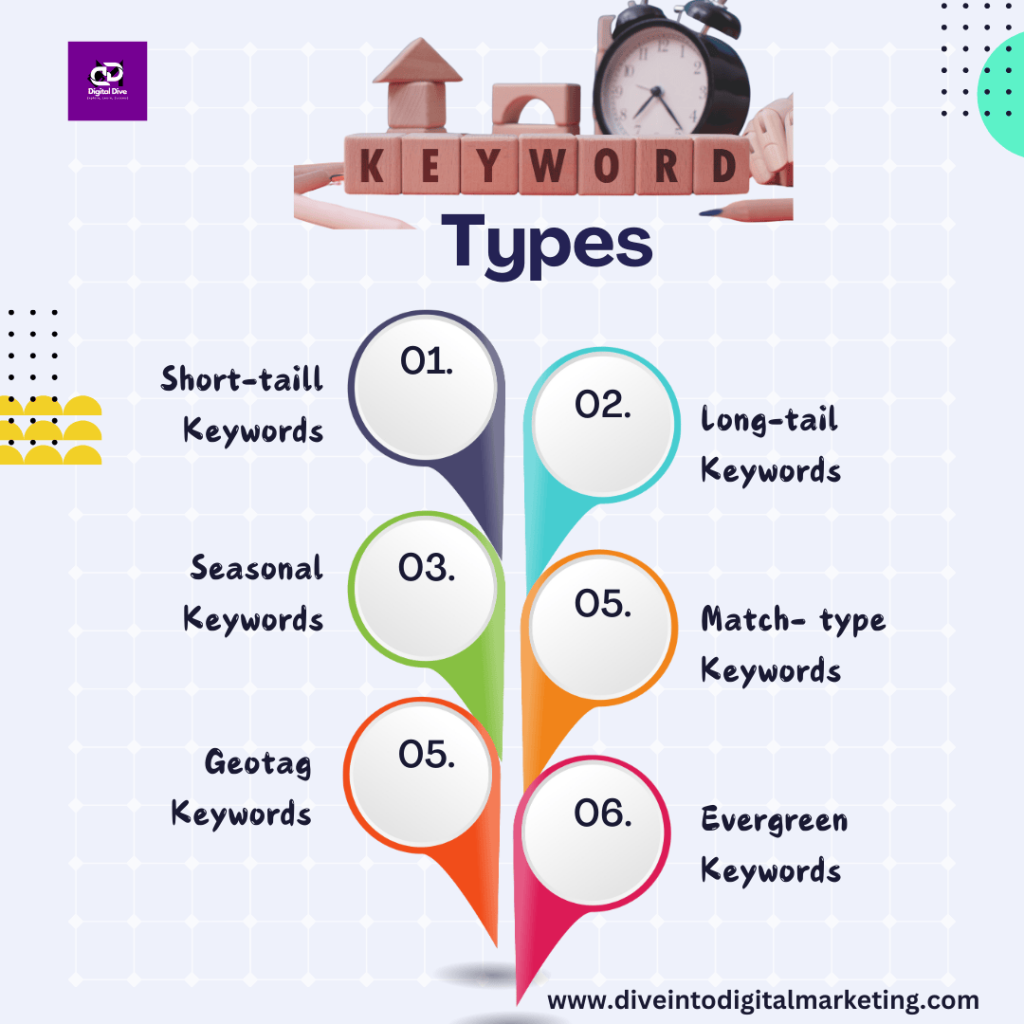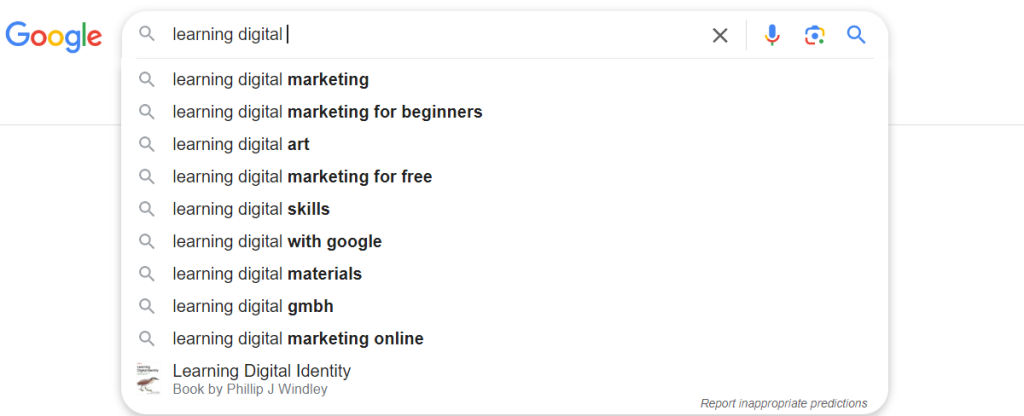Hello, and Welcome back to my blog! Today, I’m diving into a crucial and most talked about topic in digital marketing. that is the role of Keywords in SEO strategy.
As I continue my journey of learning digital marketing, I’ve got to know that, understanding how to effectively use them is really significant. All the work done in SEO, starts with keyword. So, before learning SEO we should know about keywords. Then, what are we waiting for? Let’s explore this together!
What Are Keywords?
Keywords are the words and phrases that people type into search engines when they’re looking for information. [For instance, I search learning digital marketing, here “learning digital marketing” is the keyword.] They’re fundamental element of SEO (Search Engine Optimization) because they help search engines understand the content of your website and match it to users’ search queries. (I’ll get on it later.)
Types of Keywords in SEO
Now let me introduce you to some types of keywords that we use for optimisation:
1. Short-Tail Keywords
- They are broad and are general search terms typically consisting of one to two words. To give you an example, let say you type ‘shoes’ or ‘marketing’ in search bar. This is said to be short-tail keyword.
- They have high search volume but very competitive and usually lacks specificity, which makes harder to target a particular audience.
2. Long-Tail Keywords
- They are specific phrases that usually consist of three or more words. Example ‘comfortable running shoes for beginner’ or best digital marketing courses for beginners’
- They have lower search volumes but less competition and has high conversion potential as they capture precise user intent. These are known as long-tail keywords in SEO.
3. Seasonal Keywords
- As the word refers, they are search terms that gain popularity during specific times of year, such as ‘Black Friday Sale’ or ‘Christmas decoration ideas’.
- There search volume increases during particular seasons or events and are often low in demand outside the relevant season.

4. Match Type Keywords
These keywords in SEO are categorized by how closely a user’s search query needs to match your chosen keyword for your ad or content to appear. The main types are:
- Broad Match: Shows searches related to your keyword, even if not exact. E.g., you search with running shoes, in this everything related to shoes may appear be it tennis shoes for men, or socks for running.
- Phrase Match: it displays search query that includes meaning of your keyword. For e.g., “running shoes”, in this content related to men’s or women’s running shoes or best running shoes may show up.
- Exact Match: In this only the searches that are the same meaning as your keyword should appear. For e.g., [running shoes], in this only things related with running shoes or sneakers would be shown, without including unrelated terms.
Pro Tip: Use quotation marks (" ") for phrase matches and brackets ([ ]) for exact matches to let search engines know precisely how to interpret your keyword intent. This helps your search to be refine and that’s how keywords in SEO helps too.
5. Geotag Keywords
- These are location-specific terms that help connect your content, product, or services to a particular geographic area.
- These are essential for businesses targeting local customers, as they improve visibility in local search results and can attract users looking for services or products in a specific region. (this is something I also got to know about pretty recently, and I think it surely is helpful)
- These are often used in images and can significantly enhance your local SEO efforts, ultimately driving more foot traffic to your business. (so what do you think do you get to know something new here?)
This are just some common types of keywords in SEO we use for digital marketing, but you can find other different types too. (You can learn more here.)
Why Are Keywords in SEO Important?

Keywords in SEO are important for various reasons:
1. Relevance
They help to make sure that your content is relevant to what people are searching for. If your content matches the search, the users aim for, it’s more likely to appear in search results. (and, that’s what we aim for in SEO)
2. Visibility
It means, how likely it is that the users will see and click on your website in organic search result. Using it right improves the website’s visibility in search engine results pages [SERPs]. Higher visibility means more traffic to the site.
3. Target Audience
Keywords in SEO help you attract the right audience to your website. By targeting specific keywords, you can reach people who are interested in you niche or industry. (Before I forget, here in simple terms, niche means the topic your website is about.)
Now that we know, their importance. Let’s talk about how to choose right ones that describes your website.
How to Find Keywords
Finding the right keywords in SEO is necessary for digital marketing (as I’ve talked above.) It involves a good amount of research and analysis. Here are some steps I’ve learned so far:
1. Brainstorm
Start by creating a list of words and phrases related to your content or business. Think about what your audience might be searching for. (Here, write down all possible words or phrases you can think of related to your content.)
2. Use Tools
Utilize keyword research tools like Google Keyword Planner, Ubersuggest, or Ahrefs. (Personally, I’ve worked on Ubersuggest, it’s a free keyword research tool which is easy to use but the downside is that in free version, you get only three attempts per day for keyword research. So, use it, appropriately. Ahref is a good tool too and you also get question phrases which you can use for your secondary keywords.)
3. Analyse Competitors
Look at what keywords in SEO your competitors are using. Doing this can give you an idea of what’s working related to your content or business.
*Tip: Like I said before, free versions of any tools have limited options. So, to continue your research even if the limited attempts expire, you can simply type the related ones of the content in google search bar and see most used terms with google autocomplete and get at least a vague idea.
For e.g. In the below pic I’ve only typed learning digital and all the related terms can be seen below, from this I can use the one suitable for my content easily.

4. Long-Tail Keywords
It means a phrase that is generally made from 3 to 5 words. They might have lower search volume, but they often have less competition. (I’ve explained this above, so keep it in mind.)
Where to Use Keywords in SEO
Once you’ve identified the right ones you can use, (I know it’s not easy, but I hope you’ve found the right keyword.) now it’s important to use them effectively. Let me explain:
- In the Title: Include your main keyword in the title of your blog post or webpage. This helps search engines and users understand the topic of your content. Like, in one of my previous posts I used learning HTML as my keyword and I also put it in my title.
- In the Content: It’s important that you use them appropriately so, try to naturally incorporate them into the body of content. Avoid keyword stuffing- instead, focus on writing high-quality, informative content. (Let me give you a task, try to find how many I’ve used my keyword in this post. My keyword for this content is Keywords in SEO.)
- In Headings: Try to use them in headings and subheadings [h1,h2,h3 etc] to break up your content and make it easier to read.
- In Meta Descriptions: Meta description is a snippet, that summarizes the content that’s on the web page. Include your main keyword in the meta description of your page. This improves click-through rates from search results.
(I know there are some terms which are new to you, I’ll go through those terms gradually. But if you want a blog where I only define such terms, I’m open to it. Tell me on comments.)
FAQs Section: Keywords in SEO
Now let me try to provide answers to somewhat common questions that may arise when you are working with keywords. (at least these were the questions that I wanted to know the answers of.)
a) How many keywords should you target per page?
From what I’ve learned it is best to focus on one primary keyword and a few (2-4) related as secondary keywords per page. This helps keep your content focused and ensures it remains relevant without keyword stuffing.
b) How can you avoid its stuffing?
You should use keywords in SEO naturally within the content. The focus should be on user intent and write as if you’re speaking to your audience. Add related phrases and synonyms to maintain flow while keeping your content optimized.
c) What is the ideal keyword density?
There is no fixed percentage to this, it mainly depends on your content that is how long or how much you’ve written. Generally, aim for a density of 1-2%, it means that your keywords in SEO should appear 1-2 times for every 100 words. But keeping it natural is more important, prioritize readability and user experience rather than these rules.
d) How would you know if the they are working?
You should monitor your website’s analytics using tools like Google Analytics or whatever tool you are using. Look for improvements in rankings, organic traffic and engagement metrics [e.g., time on page or bounce rate].
My Experience
When I learned about keywords in SEO, I felt more confusing than overwhelmed as there’s so much to be careful about like searching keyword, analysing it, using it effectively etc. However, using tools like Google Keyword Planner and Ubersuggest helps to simplify the process. (Note: Google Keyword Planner doesn’t always work if you’re trying out it for free without running google ads. At least, It didn’t work for me but you can try it yourself.)
I still feel lost and confused (remember, I’m still in learning process) however, with patience and practice, slowly but certainly I know I’ll get hang of it (and surely, you’ll too).
Conclusion
Understanding and using keywords in SEO effectively is a critical part of digital marketing. By choosing right keyword through research and incorporating them naturally into your content, it can improve the website’s visibility, attract the right audience, and eventually grow your online presence. (And that’s the aim of digital marketing, right.)




